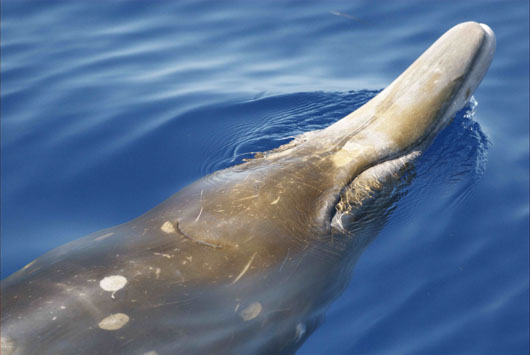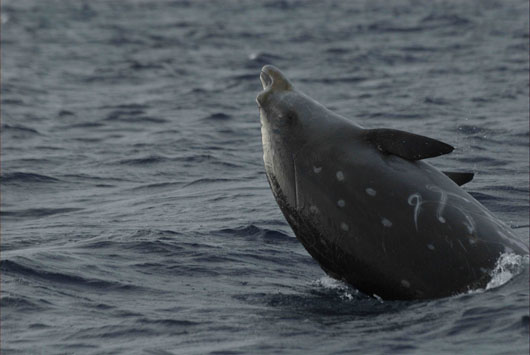Whales ‘scared’ by sonars

Photo taken by Diane Claridge © Bahamas Marine Mammal Research Organisation 2011
Beaked whales are frightened by sonars used to hunt for submarines, according to new research.
However, researchers at the University of St Andrews have found that it is not just the sound produced by sonars that frightens away nearby beaked whales.
It has long been suspected that the untimely death of some beaked whales during the time of naval anti-submarine exercises has been caused by the sonars used to detect submarines.
In the study published today, the research suggests that beaked whales are particularly sensitive to unusual sounds, including the noise caused by sonars.
The experts worked with an international group of scientists in the new study of the effects of sounds on the behaviour of beaked whales in the Bahamas.
The team played sonar sounds to whales in the wild and made precise measurements of their responses using an electronic tag attached to the whales. The tag measured all the sounds heard by the whales and their subsequent swimming movements.
Professor Ian Boyd from the University of St Andrews was the Chief Scientist. He commented, “We showed that the animals reacted to the sonar sound at much lower levels than had previously been assumed to be the case. We stopped exposing the animals to the sounds before there were any dangerous effects but it was clear that these whales moved quickly out of the way the sonars. We now think that, in some unusual circumstances, they are just unable to get out of the way and this ends up with the animals stranding and dying.”
“There was always a strong association between the death of these strange, little-known animals and naval exercises. We have now shown that this may well be the case.”
However, the researchers are cautious to note that these effects might only be caused by sonars. Professor Boyd continued, “There is a tendency to blame the Navy for every stranding event and that is ridiculous. We are now beginning to understand that some species of whales and dolphins appear to be much more robust to disturbance by sound than others.”
“We also found that beaked whales responded in the same way to sounds other than sonars, included the calls of killer whales. It appears that they just don’t like unusual sounds but the way in which sonars are used to hunt for submarines may mean that the whales are more vulnerable to that type of sound.”
Beaked whales are cryptic creatures and extraordinarily difficult to study. Despite being about the size of a rhinoceros and present in reasonable numbers offshore, many mariners will never have seen one. Researchers believe that because they are very timid, and avoid shallow coastal areas, they move away from ships or dive when aircraft pass overhead.
Professor Boyd and his team say they may have possible solutions to the problem of anti-submarine sonars, but that the broader implications are quite serious.
He explained, “I can see some quite robust advice being provided based upon our results that can help naval activity avoid the problem of causing beaked whales to strand, but I am also worried that the general levels of sound that humans make in the ocean from all sorts of sources like ships, oil and gas exploration and renewable energy may be a much more serious problem for beaked whales and some other sensitive species. Perhaps the most significant result from our experiments is the extreme sensitivity of these animals to disturbance.”
ENDS

Photo taken by Charlotte Dunn © Bahamas Marine Mammal Research Organisation
The research paper “Beaked Whales Respond to Simulated and Actual Navy Sonar” will be published by PLoS ONE online at http://dx.plos.org/10.1371/journal.pone.0017009.
Note to Editors
Professor Boyd is available for interview on 0788 176 0799 or email [email protected]
Note to Picture / Online Editors
Images and sound files are available from the Press Office – contacts below.
Issued by the Press Office, University of St Andrews
Contact Gayle Cook, Senior Communications Manager on 01334 467227 / 462529, mobile 07900 050 103, or email [email protected]
Ref: Sonars 140311
View the latest University press releases at www.st-andrews.ac.uk
Category Research